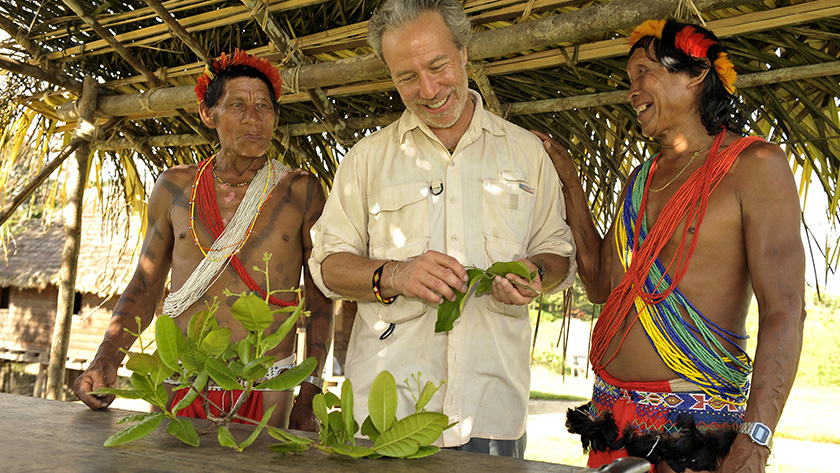Seven years ago, I was in one of the most remote places on the planet, hiking through the rainforest of the northwest Amazon, following an indigenous colleague clad in only a breechcloth. We entered a cassava garden at the edge of the rainforest. All the cassava was dying. I asked him the cause of the problem.
“Cambio de clima,” he said. Climate change.
Here in this exceedingly remote outpost, the ugly specter of climate change had raised its head. Indigenous peoples are much more attuned to these types of changes in the natural world because their well-being is much more closely and immediately tied to nature than is ours here in the industrialized world. When they warn us, we need to listen. When Alan Ereira was making his famous film “From the Heart of the World” in northern Colombia over 30 years ago, the Kogi peoples told him that their glaciers were melting and asked him how we outsiders—the “Younger Brothers” in their parlance—were causing this. Almost assuredly, the challenge of climate would have been easier to tackle then.
So why not give them a listen?
That’s really what the Amazon Conservation Team is all about. Our mission is to work in partnership with indigenous colleagues to help them better protect both their culture and their traditional lands. We also serve as a platform and a megaphone for indigenous voices that need to be heard, and provide training, encouragement and the tools for this purpose. To date, we have partnered with over 55 tribes to map almost 80 million acres of ancestral rainforests, and have facilitate the creation and expansion of nearly two million acres of indigenous reserves.
One of the many ways we highlight the importance and relevance of indigenous knowledge is my newest book, The Amazon: What Everyone Needs to Know, published by Oxford University Press. Much of the Skoll Foundation Community is familiar with this series due to David Bornstein’s excellent volume on social entrepreneurship, published about a decade ago. A major focus is documenting that much of we know about the Amazon rainforest is derived from indigenous knowledge, such as the uses and applications of ayahuasca, coca, curare, and cassava.
Keep in mind that ayahuasca and psilocybin—the latter derived from mushrooms employed by indigenous peoples elsewhere in tropical America—are being studied as therapies at institutions like Johns Hopkins University—as treatments and possible cures for conditions like addiction, depression, and PTSD. Meanwhile, cassava, which was first domesticated in Amazonia, feeds more people in the tropics each day than any other crop plant other than rice. And Amazonian electric eels are being studied to help design better hydrogel batteries for powering medical implants.

Meanwhile, the book answers a myriad of common questions while debunking some common misconceptions: yes, the Amazon does harbor hallucinogenic frogs, pink dolphins, and uncontacted tribes and no, the rainforest is not the lungs of the earth nor does it provide 80 percent of all prescription medicines. There are chapters on climate change, the role of China and the Amazon fires of 2019. And if you wonder what Charles Darwin, Henry Ford, and Winston Churchill have to do with the Amazon, then this is the book for you.
So, why should we care about the Amazon? And why should we care about nature in general? For me, conservation and wise stewardship of nature is—first and foremost—an ethical exercise. Nonetheless, Amazonia plays a vital role in stabilizing local, regional and international water cycles. This rainforest is a vital carbon sink—in fact, rainforest destruction is believed to be the number two driver of climate change. Wild and semi-domesticated relatives of avocado, chili pepper, chocolate, manioc, papaya, peanuts, pineapples and yams harbor important germplasm for increasing yield and resistance to pests and diseases wherever these crops are planted. And the Amazon feeds and provides potable water to millions of the poorest people in the world.
I recently wrote an editorial on COVID-19 for the Los Angeles Review of Books. In it, I pointed out that this pandemic was launched by human’s abuse of nature—and that bats in the Amazon harbor as many viruses as do bats in Southeast Asia, where this coronavirus first appeared. These bats live with these viruses without getting sick: are there not lessons to be learned there about how to keep viral pandemics at bay?
As an ethnobotanist who has been studying tribal healers for over three decades, I have sometimes seen them and their plants cure afflictions that western physicians could not.
Is the cure for COVID-19 waiting, undiscovered, in the Amazon? Anyone who assures you that it is, is an idiot. But anyone who assures you the cure for COVID-19 (or insomnia or depression or cancer) is not in the Amazon is a bigger idiot. Because we just don’t know.
In Amazonia, that means not only helping the locals to protect and steward forests, rivers, plants and animals, but empowering them to protect their cultures and their sustainable livelihoods. One day, it just might save our lives.
To learn more about what the Amazon Conservation Team is doing to protect Amazonia in partnership with indigenous communities and local partners, visit amazonteam.org.
Want more stories of transformational change on the world’s most pressing problems? Sign up for Skoll Foundation’s monthly newsletter.